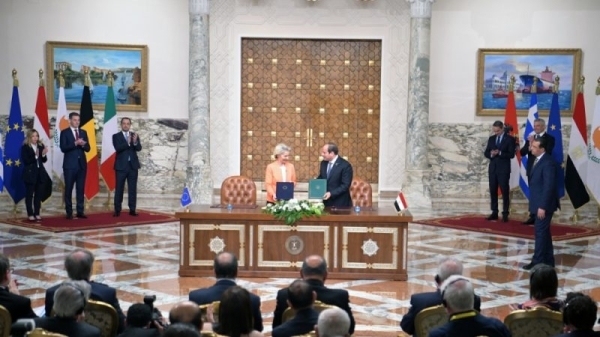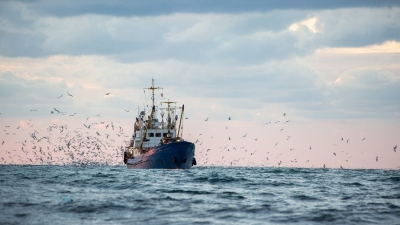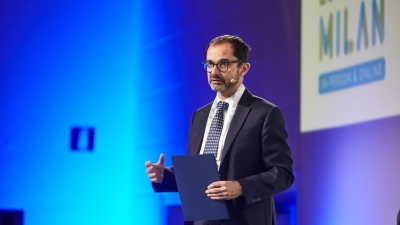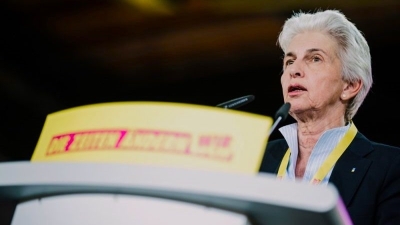EU agrees to controversial €7.4bn migration deal with Egypt

European leaders and Egyptian President Abdel Fattah al-Sisi have struck a deal to curb migration from Egypt, with the EU bloc agreeing to provide €7.4 billion in aid until 2027 to help manage migrant flows and boost the economy – a move criticised across the political spectrum, especially in Italy.
EU Commission President Ursula von der Leyen, Italian Prime Minister Giorgia Meloni, Greek Prime Minister Kyriakos Mitsotakis, Cypriot President Nikos Christodoulides, Austrian Chancellor Karl Nehammer, and Belgian Prime Minister Alexander De Croo joined in the signing of the joint declaration with al-Sisi on Sunday.
“Egypt is a pillar of stability and security in the Middle East. We will work hand in hand with Egypt and other partners to channel aid to Gaza via all possible routes,” von der Leyen wrote on X.
“Civilians must be protected, and there can be no forced displacement of Palestinians from Gaza. We want to work towards a lasting peace based on a two-state solution,” she added.
The agreement, which upgrades the EU’s relationship with Cairo to a “strategic partnership”, aims to boost cooperation in several areas, including renewables and trade, in exchange for a financial boost to help Egypt tackle its current very high inflation.
As part of the deal, €5 billion will be made available in the form of concessional loans, €1.8 billion in the form of investments, €600 million in the form of grants, of which €200 million will be used to address migration issues, according to an EU document.
Egypt is a “fundamental partner for the resolution of the Israeli-Palestinian conflict,” a decisive ally for the stabilisation of North Africa, and a partner in the control of migration routes, Meloni said about the new deal.
“It is a similar initiative to the one we carried out in Tunisia, a memorandum of understanding also in Egypt,” Meloni said before she joined the delegation in Egypt – echoing her policy of strengthening relations with North African countries as part of her so-called “Mattei Plan for Africa”.
“In parallel, there is bilateral cooperation work concerning the Mattei Plan for cooperation in agriculture and training,” said Meloni, adding, “We will also sign agreements and collaborations in the fields of health, support for small and medium-sized enterprises, and investment.”
There is “a huge opening of credit” from African countries, which must be answered with “concreteness,” making the promise of a “peer-to-peer” approach a reality, the Italian prime minister added.
However, both deals have been criticised by socialists, liberals, and part of the centre-right European People’s Party (EPP) in Brussels, who do not consider Egypt and Tunisia as countries that guarantee respect for human rights.
In Italy, Democratic Party Secretary Elly Schlein commented on the situation, saying, “It is very serious that Ursula von der Leyen flies to Egypt together with Giorgia Meloni to promise resources to the al-Sisi regime in exchange for controlling and stopping the departures [of migrants].”
On the government’s side, Lega leader and Deputy Prime Minister Matteo Salvini also criticised the deal, saying that “if someone from the centre-right prefers the armchair and the agreement with the socialists to the united centre-right, it will harm Italy.”
Trade between Italy and Egypt in 2023 was valued at €6 billion (€3.3 billion for Italy’s exports, €2.6 for imports), Il Sole 24 Ore reported.
Italy’s main exports to Egypt include base metals (25.4%), chemicals and chemical products, products of mineral extraction from quarries and mines, coke and refined petroleum products. There are also 114 Italian companies operating in Egypt, with 11,668 employees and a total turnover of €6.6 billion.
(Federica Pascale | Euractiv.it)
Read more with Euractiv




